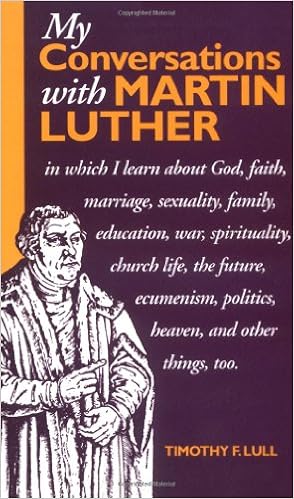Saturday, September 26, 2015
A short discussion on having conversations with the past
I just finished reading Timothy F. Lull's short book (only 154 pocket-sized pages) My Conversations with Martin Luther. This book was given to me as a confirmation present on Reformation Day, October 31st, 2000 by the church I was confirmed in. I've had the book since then, patiently sitting on my shelf until the opportunity arose for me to read it. An essay contest involving having a contemporary conversation with Luther gave me the motivation I needed to read this book, and I am glad to have done so.
The book is divided into six chapters, detailing six conversations Lull had with Luther over the course of a decade. These conversations are just that--Martin Luther, the famed Reformer, appearing to Lull and having brief conversations about events from Luther's life and about Luther's works. Lull begins by saying that the reality of these conversations having actually having taken place are more or less irrelevant, saying that he believes "the book will make for better reading if those who decide to explore it will put away such questions as what did and did not happen, what might or might not have taken place, and instead follow what Dr. Luther has to say--whether from any actual visit or in my (supposed) fantasy" (p 7). The conversations range from Luther's biographical details to Luther having the chance to revisit his (quite frankly, detestable) writings on the Jews. Lull was quite an excellent Luther scholar and while this book purposefully takes a light, conversational tone, the scholarship is evident nonetheless.
The purpose of this post is not to write a review of Lull's short little book, although, I do recommend that anyone interested in Luther studies read it. Instead, I want to comment on Lull's hope from this book, namely, that others will be inspired to have their own conversations with Luther. Lull doesn't just lead the reader to fend for themselves; Lull actually gives three pieces of advice for how the reader might have their own conversation with Martin Luther. I think these three tips work for any great thinker of the past, so I will share them here:
1. Read the thinker's own words. For Luther, Lull recommends specific works, such as his own edited volume, Martin Luther's Basic Theological Writings. This is essential for any writer, though--start with their words!
2. Read a biography about the thinker. Once you have read the words of your subject, now read a biography so you can place them in context of their life. This also lets you get acquainted with how others saw them. For Luther, Lull recommends many books, including my personal favorite, Heiko A. Oberman's Luther: Man Between God and the Devil.
3. Lastly, read scholarship on the thinker. By this, Lull means to look specifically at what you want to talk about with your intended conversant. Once you have that issue or theme in mind, look for contemporary scholarship on it. For Luther, Lull recommends serious items of scholarship on the reformation (such as Eric W. Grtisch's Fortress Introduction to Lutheranism) to perhaps more whimsical or lighter fare, such as a travel guide that allows you to visit some of Luther's haunts (Wolfgang Hoffmann's Luther: A Practical Travel Guide).
I think these three nuggets of wisdom are essential to any conversation with the past. It is often intimidating for someone to take up conversing with the past--I know often times I am often imitated when approaching the works of an accomplished thinker. Where do I start? In someone as prolific a writer as Luther (with over 100 volumes of his work in the Weimar Edition of his works), it can be even worse. It helps when you have a guide like Lull's book, which eases you into the writings. Even without that, with the internet it generally isn't too difficult for most authors (obviously not super obscure ones) to find what work is probably best to start with. Aside from that, as Lull's conversational and informal tone implies, have fun!
Two final notes: My own recommendation for Luther is to start with his Small Catechism. This little book goes over the core of Christian beliefs, and as such, the core of Luther's teachings. It is available in its entirety on the ELCA website, in addition to a few hundred different print editions, including being a part of the Evangelical Lutheran Worship hymnal.
Second, and this is just a personal note of serendipity: before moving out to Berkeley, CA, I had no idea that Lull was formerly the president of Pacific Lutheran Theological Seminary, also in Berkeley, CA, up until his death in 2003. Imagine my surprise when I open his book to find that much of these conversations with Luther happened only a mile away from where I was reading them! I of course knew of Dr. Lull, especially his aforementioned Martin Luther's Basic Theological Writings, but I did not know much of his biographical information. How cool it was for me to read his words overlooking the same scenic San Francisco Bay that he saw as he wrote them, twenty years earlier.
Subscribe to:
Post Comments (Atom)


0 comments:
Post a Comment